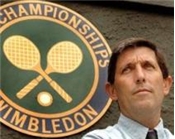
He is best known for overseeing the world's most prestigious tennis tournament but, with Wimbledon still four months away, referee Andrew Jarrett has plenty of other things to keep him occupied.
The 53-year-old has just returned from women's Fed Cup duty in Estonia and, later this month, he is being sent to Israel, where the country's best male players will take on Poland in the Davis Cup.
Jarrett, who was born in Belper, acts as a referee at these tournaments alongside his work towards this year's action at SW19 – but said he loves the variety which comes with getting involved in different competitions.
Although it is 30 years since Jarrett made his playing debut for Great Britain in the Davis Cup, he believes the intensity of the international team tournament has not changed a bit.
"It is easy for players to say that the era they are competing in is the most intense but I really don't think it changes as time goes on," he said.
"The crowds might be a bit different and they are certainly bigger but it still remains just as special.
"I think there can be more intensity in the Davis Cup than the Fed Cup but, of course, the big difference is that there are five sets in the men's and three in the women's.
"But the atmosphere is good in the Fed Cup as well, which is great for the women because it can be better than during their regular tournaments."
Last year, Jarrett was the referee at Wimbledon for the fifth year running, after taking over in 2006 when predecessor Alan Mills retired.
He is the last word on contentious decisions and has the power to disqualify players for misconduct.
But, as part of his work with the International Tennis Federation, he is also involved with other tournaments throughout the year and can be sent abroad at any point.
Jarrett said: "It's a bit like a lucky dip and that's nice, because you get to go to places which are not always the most obvious.
"But it really adds variety to your life and that is one of the beautiful things about tennis. It is played in different places, or different surfaces, in different weather and in completely different atmospheres.
"In terms of the role itself, not a lot changes. With the Fed and Davis Cup, you do get to be around the players more than at Wimbledon and can then give them a wave when you see them at the Grand Slam tournaments but that's about it.
"But, for me, taking part in different competitions makes me very fortunate."
In Estonia, Jarrett's job was to check rules and regulations were being met in the Tere Tennis Club, Tallinn, where Spain beat the home nation 4-1 in the World Group Two first round contest.
He arrived four days before play began and his role involved helping to set up the venue, ensuring practice times were suitable, speaking to the country's captains about their responsibilities and managing the crowd.
Jarrett, who played 100 tennis matches for Derbyshire, said: "The job varies greatly depending on the different nations.
"Some countries can have quite tough crowds because, naturally, they are excited and nationalistic. It is about the closest you get to a football crowd in tennis.
"It was actually my first visit to Estonia and it was lovely. The centre is spectacular and in a very old city.
"I think it will be very nice there in the summer but it was freezing while we were out there.
He added: "You can see tennis developing across the world when you visit these places and I think it is escalating quickly in certain countries now because it is an Olympic sport and funding often becomes more easily available because of this."
Jarrett will then fly out to Israel on February 28, with the competition starting at the Canada Stadium, in Ramat Hasharon, four days later.
Because Israel and Poland both received byes in the first round, they will be playing against each other in the Europe/Africa Zone Group One second round.
He said: "The most intense match I remember being at was when Israel played Russia in the Fed Cup.
"An enormous crowd was spilling in to try and see Maria Sharapova play, it was incredible.
"The only danger in the team competitions is that, because they are best-of-five rubbers, if it's straightforward for one team, it's no longer a competition and no longer interesting for people. It's better for them when they are close contests."
Jarrett, who competed in the men's singles tournament at Wimbledon from 1977 to 1983, said it was also interesting to see how different players reacted when appearing for their country.
He said: "Playing for your country is a very different kind of pressure for a player and it can sometimes have a negative effect.
"But it is a great leveller. Sometimes, you will get certain players who don't have the best rank but who get really pumped up and motivated for the rubber.
"Then you sometimes see the better players get over-heated and perhaps not do as well.
"When we played in the Davis Cup, it was very important and we were very excited about playing. It was a great thrill.
"I think I was particularly motivated because I felt I was a better player than when I took part in regular tournaments and that was a positive factor for me."